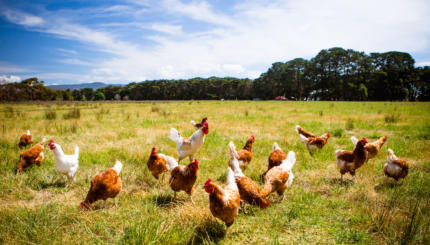Most of the laws concerning meat derive from two Torah passages: Leviticus 11 (Parashat Shmini) and Deuteronomy 14:3-21 (Parashat Re’eh). These passages go into extensive detail, listing which animals the Israelites can eat and which they cannot. Later rabbinic texts elaborate on these commandments and address areas of ambiguity.
Kosher Animals by Category
The general rules are:
Mammals
Only those with cloven hoof and that chew their cuds, such as oxen, sheep, goats, deer, gazelles, roebuck, wild goats, ibex, antelopes, and mountain sheep. Pigs — the best-known non-kosher mammal — are not kosher because they do not chew their cuds. Other taboo mammals include camels and rabbits.
Birds
The Torah lists a number of forbidden birds, but does not specify which ones are allowed. The most common birds that Jews have traditionally considered kosher are chickens, turkeys, ducks, geese and pigeons. Among the explicitly forbidden birds are: vultures, ostriches, hawks and sea gulls.

Help us keep Jewish knowledge accessible to millions of people around the world.
Your donation to My Jewish Learning fuels endless journeys of Jewish discovery. With your help, My Jewish Learning can continue to provide nonstop opportunities for learning, connection and growth.
Fish
Only those with fins and scales. (Learn more about kosher fish here.) Shellfish of all kinds are forbidden.
Reptiles, Amphibians and Insects
All are forbidden, except for four types of locusts.
Other Requirements for Kosher Meat
In addition to specifying which animals can and cannot be eaten, Jewish dietary law requires that land animals be slaughtered according specific protocols. (Learn more about kosher slaughter here.) All blood must be drained from the meat before it is prepared. The meat of animals that were hunted or were found after they died of natural causes is not kosher.
Jewish dietary law also stipulates that meat cannot be served in the same meal as dairy. Learn more details about keeping kosher here.
Talmud
Pronounced: TALL-mud, Origin: Hebrew, the set of teachings and commentaries on the Torah that form the basis for Jewish law. Comprised of the Mishnah and the Gemara, it contains the opinions of thousands of rabbis from different periods in Jewish history.

Help us keep Jewish knowledge accessible to millions of people around the world.
Your donation to My Jewish Learning fuels endless journeys of Jewish discovery. With your help, My Jewish Learning can continue to provide nonstop opportunities for learning, connection and growth.



